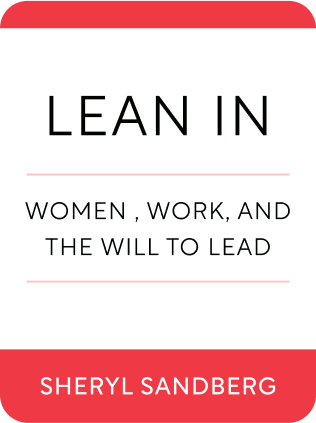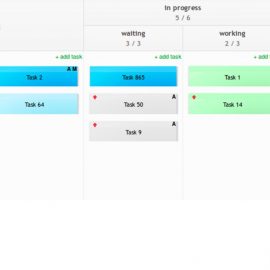

This article is an excerpt from the Shortform book guide to "Lean In" by Sheryl Sandberg. Shortform has the world's best summaries and analyses of books you should be reading.
Like this article? Sign up for a free trial here .
Why do women find it harder to climb up the career ladder? What are the main factors that prevent women from reaching for senior roles?
It’s often hard for women to take the necessary risks for professional growth. They’re more likely to accommodate a partner’s career, and relocating may not be an option when the family is the priority.
Below are a few pieces of career advice for women by Sheryl Sandberg, who is known for her efforts for empowering women at work.
Long-Term Dreams and Short-Term Career Plans
Now that women are aware it’s ok to be ambitious, how should they plan for their career trajectory? Here is Sheryl Sandberg’s career advice for women:
While a career path doesn’t need to be mapped out, setting two types of plans is key:
- Long-term dream. This doesn’t need to be specific or even realistic. It could reflect a desire, for example you want to travel, have free time, or to win a prize. Even a vague goal provides direction. Sandberg’s advice: Don’t think about what you want to be; think about what you want to do. (Her long-term goal was to change the world.)
- 18-month plan: Set goals on 2 fronts:
- Targets for what your team can accomplish professionally. Employees who focus on results become valuable to the company — this is communal thinking as well as good business.
- Learn new personal skills as they relate to your career. Everyone has room to improve. For example, if you talk too much or too little, you can seek help to correct the tendency. If you’re missing a skill, go learn it.
Seek Out Growth and Take More Risks
In any field, there are jobs and companies with more potential for growth than others. Women in particular must take more career risks because diverse experiences prepare you for leadership. Stability too often comes at the price of growth opportunities.
For Sandberg, the opportunity to join Google seemed ideal — its mission “to provide the world access to info” appealed to her long-term goal of changing the world. But Google was a wildcard — a new company without clear direction; other more traditional companies had offered her more clearly defined opportunities.
Eric Schmidt told her “not to be an idiot.” He said potential for growth should be the only criteria for job selection. “If you’re offered a seat on a rocket ship, you don’t ask what seat. You just get on.”
Sometimes women miss out on a great opportunity because they’re too focused on the level or title, fearing a career setback. But if the move means learning new skills, you’re actually moving forward. When Sandberg eventually left Google to become Facebook’s COO, she passed up offers from other companies willing to hire her as CEO. She took a lower position because she prioritized potential for growth and the company mission over levels and titles.
Women Are Risk-Averse
It’s often hard for women to take the necessary risks for professional growth. They are more likely to accommodate a partner’s career, and relocating may not be an option when relationships and families are the priority.
Being risk-averse also means women are reluctant to take on challenging tasks in their current job. While men look for “stretch” assignments, women tend to hang back doing what they do best, worrying if they have the skills for a new role. Since skills are acquired on the job, this becomes a self-fulfilling prophecy. Data shows that women apply for a job only if they meet 100 percent of the criteria. Men are comfortable applying for a job if they meet only 60 percent of the criteria; they figure they’ll learn the rest on the job.
Women are also risk-averse when it comes to applying for a promotion. They believe a good job performance will naturally lead to advancement; they shouldn’t have to advocate for themselves. This is termed the “Tiara Syndrome”: women think if they do a good job, someone will notice and place a symbolic tiara on their head, rewarding them with respect.
In a perfect world performance would be automatically rewarded. But in our world, advocating for yourself is necessary. Women have to take great care when advocating for themselves so they don’t hurt their likeability, as discussed previously, but it has to be done.
Find a Mentor
While men have an easy time finding and maintaining mentor relationships, women do not. Women tend to take a more active approach to find a mentor, even trying to chase and force a mentor connection. They know the stakes are high and their chances of achieving skyrocket with a well-placed mentor.
But Sandberg counters that women have it backwards. A mentorship connection has to develop naturally. Studies show that mentors select mentees based on performance and potential. Instead of trying to find a mentor who will lead them toward success, women should excel first, get noticed, then allow an organic mentor relationship to develop.
It’s not, “Get a mentor and you’ll excel.” It’s, “Excel and you’ll get a mentor.”
To find and develop a mentor relationship, understand that approaching someone and asking, “Will you be my mentor?” does not work. But approaching someone with a well-thought-out inquiry could spark a discussion and a relationship.

———End of Preview———
Like what you just read? Read the rest of the world's best book summary and analysis of Sheryl Sandberg's "Lean In" at Shortform .
Here's what you'll find in our full Lean In summary :
- How professional, personal, and societal hurdles are holding women back
- Why you need to commit to your career with risks and ambition
- How your career is more like a jungle gym than a ladder






